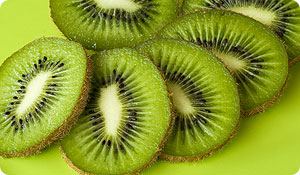
Do you enjoy the sweet taste of kiwi? This popular fuzzy-skinned fruit (which originates from China) is high in potassium, vitamins C, A, and E, and fiber. A growing number of people consider kiwis to be one of their favorite picks. Yet as the popularity of kiwis grow, so does the number of people who are allergic to this tart, Eastern fruit.
The Latest Findings on Kiwi Allergies
If eating kiwis makes you itch or wheeze, you might want to learn more about the varieties available before you put this on your "do not eat" list. The truth is, scientists now believe that certain types can be easier for some people to tolerate.
Judge a Kiwi by its Color
Not all kiwis are created equal and not all spark similar reactions according to scientists from the Medical University of Vienna, Austria. These researchers looked at a group of 37 people with food allergies to find out how their immune systems responded to six different kiwi species. Through a combination of skin testing and oral allergy challenges, the researchers discovered that the color of a kiwi may determine how likely it is to spark a reaction. This finding was reported in the Journal of Allergy and Clinical Immunology.
Golden Kiwis
Scientists found that kiwis with a golden color seemed to cause the mildest reactions. On the other hand, the common Hayward kiwi, which has a brown skin and a bright green inside, caused more severe allergy symptoms. The difference between the golden and the Hayward kiwi seems to be a protein that triggers an allergy in highly sensitive individuals and occurs in higher concentrations in other species.
Eat With Caution
If you're sensitive to certain kiwis but want to see if you can tolerate other types, be sure to talk to your doctor first and make sure it's safe for you to experiment with different kinds of kiwis. Some people with severe reactions should steer clear of all types of kiwis. However, if you have only a mild reaction and your doctor gives you the okay, you may be able to try a golden kiwi to see if it's easier for you to tolerate.
Beware of Kiwi Allergy Symptoms
If you do indulge in the sweetness of this fruit, always be on the lookout for any symptoms that can indicate an allergy to kiwi.
This includes:
- Tingling or itchy mouth
- Swelling of the mouth and throat
- Skin rash
- Upset stomach or abdominal pain
- Difficulty breathing
In the case of a severe allergy to kiwi, you might also experience a dangerous drop in blood pressure. If you do notice any severe or worrisome signs after eating kiwi or any other foods, always seek emergency medical care immediately.
It's also important to know that if you're allergic to latex, you could be more prone to reacting to kiwi because of a similarity that exists in the proteins in both items.
Sources:
"Allergy & Asthma Advocate: The Low-down on Latex Allergy." American Academy of Allergy, Asthma, and Immunology. AAAAI, Fall 2008. Web, 23 Jan. 2011.
J.S.A. Lucas, K. Collins, K. Grimshaw, J. Warner, J. Hourihane. "The Clinical Investigation of Kiwi Fruit Allergy." The Journal of Allergy and Clinical Immunology, Volume 113, Issue 2, Supplement (Feb. 2004): S145. Web, 25 Jan. 2011.
"Some Kiwi Varieties May Be Less Allergy-Inducing." Reuters Health. Reuters, 3 Dec. 2010. Web, 23 Jan. 2011.
Takamasu, T. and K. Kurihara. "Kiwi Fruit Allergy Evaluated the Difference between Green and Gold." Journal of Allergy and Clinical Immunology, Vol. 123, Issue 2, Supplement. (Feb. 2009): S28. Web, 27 Jan. 2011.





